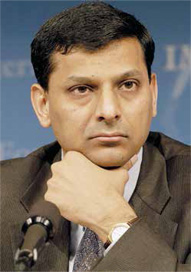
The former governor of the Reserve Bank of India, Raghuram Rajan has been named as one of the contenders for the top position of the UK’s central bank wherein he is likely to replace Mark Carney, the current governor of the Bank of England. But Rajan, with significant achievements at the RBI, is of a different view about the same, if some of the media is to be believed. According to the London- based Financial Times, “Attracting Raghuram Rajan, the highly respected Chicago-based economist and former Reserve Bank of India governor, would be a coup, as would securing Agustín Carstens, Mexico’s central bank chief and the new general manager of the Bank of International Settlement.” And the newspaper went on to add, “The government, which selects the governor and deputy governors of the central bank, has not ruled out another non-British appointment and is seeking a figure who can make an impact on the global stage as the UK prepares for Brexit,” about Rajan, who was the first non-western and the youngest at 40 to become the chief economist at the International Monetary Fund. At present, Raghuram Rajan is in Chicago, and is now the Katherine Dusak Miller Distinguished Service Professor of Finance at the University of Chicago Booth School of Business. Philip Hammond, UK chancellor, is to select the next governor of the Bank of England to replace Mark Carney next year. According to the article, the chancellor said he had already begun looking for candidates in forums such as the International Monetary Fund spring meetings in Washington.
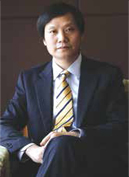
Xiaomi expects to disrupt India’s TV industry the way Reliance Jio disrupted the telecom space, the company’s founder Lei Jun said. Speaking to ET, Jun said that Indian consumers should get 32-inch TVs for as low as Rs.10,000 but for that to happen, the government needs to lower taxes, a suggestion he would like to give to PM Narendra Modi if he gets a chance to meet him. Xiaomi is looking to also make its TVs in India sometime in 2018, and will look to set up factories for the same. Jun also expects explosive growth for smartphones in India, which No. 1 ranked Xiaomi should be able to tap, backed by an improved supply chain, compared with the de-growth in China. “Yes, definitely. We believe that from product design, integrating hardware and internet services and from our operating efficiency of our TV business, we have made great improvements. So, we hope that in a relatively short period of time, we will become the No. 1 smart TV brand in India. We are planning to make India programs for the TVs as well,” he said.
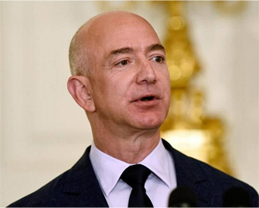
World’s richest man and Amazon CEO Jeff Bezos recently sent his annual letter to the company’s shareholders. In the letter, Bezos outlines the company’s strategy, investments as well as mentions several milestones achieved by the world’s No. 1 e-tailer during the year 2017. Amazon India’s operations too finds mention in Bezos’ letter. Talking about Amazon’s voice assistant Alexa, he wrote, “Finally, we’ve dramatically reduced the amount of time required to teach Alexa new languages by using machine translation and transfer learning techniques, which allows us to serve customers in more countries (like India and Japan).” Prime selection in India now includes more than 40 million local products from third-party sellers, and Prime Video is investing in India original video content in a big way, including two recent premiers and over a dozen new shows in production. The 54-year-old, who has allocated a total $5 billion of investments to India, said the internet behemoth was the most visited site on both desktop and on mobile, along with being the highest downloaded shopping app in India in 2017.
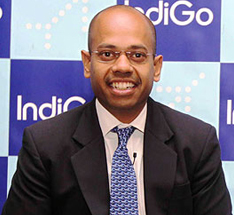
A few days before their board meeting to finalise the results for March quarter, IndiGo announced that its President Aditya Ghosh will relinquish his post and its promoter Rahul Bhatia will take charge as the interim CEO. In a statement the airline stated that, ‘Aditya Ghosh will cease the post as the president with effect effective on July 31, 2018’, and went on to add that its board of directors has accepted Mr Ghosh’s resignation. Meanwhile, the company announced the appointment of Gregory Taylor as Senior Advisor to the company. He will report directly to Bhatia. The board will consider Taylor’s appointment as president and CEO in due course. Bhatia welcomed Taylor’s decision to rejoin the company. He served as the executive vice president of revenue management and network planning at IndiGo between 2016 and 2017. “His enormous and varied experience and understanding of the complexities of the airline industry will be invaluable to our future plans. At the same time, we thank Aditya for all his hard work and contributions and for the successes that the company has enjoyed,” Bhatia said in a statement.
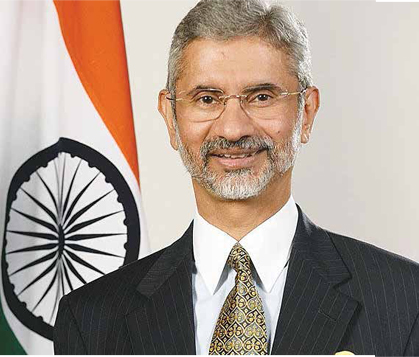
After seeking the cooling-off period from Prime Minister Narendra Modi, S. Jaishankar, former Foreign Secretary, takes charge as the Tata’s Group’s president of Global Corporate Affairs, according to a Tata Sons’ release. In his new assignment Jaishankar will report to N. Chandrasekaran, Executive Chairman of the Group. Jaishankar had retired on January 28, 2018, after which he reportedly wrote to PM Modi for a waiver of the ‘cooling-off period’ for bureaucrats citing the offer from the Tata Group. The ‘cooling-off period’ was reduced to a year from two years after 2015. As per the rule, all central civil servants have to seek permission from the centre before taking up commercial jobs within a year before leaving office. In his new avatar, he will be responsible for the Tata Group’s global corporate affairs and international strategy development, and Tata Sons’ international offices will report to him. Commenting on the move taken, N. Chandrasekaran, Chairman, Tata Sons, said, “I am delighted to welcome Dr Jaishankar to the Tata Group. His extensive experience and knowledge on international affairs will be very valuable to the group as we work to reinforce our brand and leadership globally.” “The Tata Group is an iconic institution known for its value-based leadership as well as India’s most respected brand globally. I look forward to being part of the Tata Group and working with key stakeholders to make an impact,” said Jaishankar, who had a great repertoire with the PM as well as External Affairs Minister Sushma Swaraj. His major achievements in office include negotiating a peaceful talk process during the Doklam stand-off and successful negotiation during the Indo-US civilian nuclear agreement. A graduate from St Stephen’s College, Delhi University, he also has a Master’s degree in Political Science and an M Phil and PhD in International Relations from Jawaharlal Nehru University (JNU). He joined the Indian Foreign Service in 1977, holding key roles during his career including stints as High Commissioner to Singapore, Ambassador to China and the United States.
Anmol Ambani, the eldest son of Reliance Group chairman Anil Ambani, has been appointed on the boards of Reliance Nippon Life Asset Management (RNAM) and Reliance Home Finance (RHF), according to a statement by Reliance Capital, a part of Reliance group. Anmol Ambani, 26, is currently the Executive Director of Reliance Capital, the holding company of the Group’s financial services business. “Anmol has effected significant changes to the senior leadership team in the group companies, attracting a string of top talent from reputed companies. This positions us better for future growth, has helped bring in fresh thinking and augurs well for the culture change Anmol is driving across the group,” Anil Dhirubhai Ambani said. Anmol was inducted into the board of Reliance Capital in August 2016. He has played an active role in steering the strategy and performance of the operating companies working closely with their respective CEOs, and in bringing about greater cohesion among group entities, Anil Ambani added further. “In a fast-growing economy, the potential for both Reliance Nippon Life Asset Management and Reliance Home Finance is immense... We are capturing these opportunities as our recent financial performance reflects,” said Anmol Ambani.

It could be all in the family as Dr Prathap C. Reddy is on course to navigating succession issues by trusting the mutual respect shared by his four daughters. Even as a model of rotating chairmanship is being proposed, the Reddy sisters are only focused on the secure future of Apollo Hospitals. First-generation entrepreneurs have been known to flounder on the succession issue. Not only is it a touchy—even volatile—subject, it is also left unresolved till too late due to either oversight or complacence. But Dr Prathap C. Reddy, founder-chairman of Apollo Hospitals, is not shirking this responsibility. The 81-yearold promoter has been preparing for the future for a while now, grooming his daughters into various leadership positions in the hospital chain set up by him, while he continues to play an active role. And they haven’t let him down. “My daughters got passionately involved in the business. They did everything,” says the proud father. “They even printed the first brochure of Apollo Hospitals, which was so good that people in the US didn’t believe it was made in India. They were involved right from that level.” This commitment from the entire family has proved to be the accelerator Apollo Hospitals needed. Consider that from a 150-bed hospital in Chennai in 1983, Apollo has grown to an 8,617-bed hospital chain with 100 clinics and 1,600 pharmacies across the country. Confident in the growth momentum, the family felt the organisation needed to be revitalised. Shobana Kamineni who, at 54, is the third of Reddy’s four daughters. In July last year, then, a seven-member family council headed by Reddy, and including his four daughters and two professional advisors, met to decide the best way to rejig the structure. The council concluded that the most effective approach would be to redefine the role of every family member; this would give everyone a clear focus. “We needed a focus so that we could perform our roles well,” says the oldest daughter, Dr Preetha Reddy, 57. In the reorganisation that followed, Preetha and Shobana were promoted to executive vice chairpersons; Suneeta Reddy, 55, was made managing director and Sangita Reddy, 52, joint managing director.
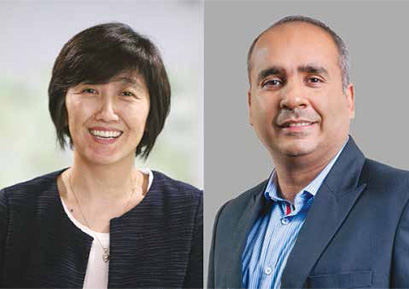
GSK Consumer Healthcare in their bid to brighten their HR department have elevated Ongmu Gombu, EVP-HR for the Indian Subcontinent (ISC) to a pan-Asia role. She will now be vice-president, HR operations lead, Asia. Gombu has been managing HR for GSK ISC for the last three years. Gombu’s position will now be taken over by Rahul Kapoor, who is currently HR director for Japan, Korea and South East Asia at GSK, and will report to Arun Sehgal, vice president-HR, Asia Pacific, and support Navneet Saluja, managing director, GSK Consumer Healthcare. He will be a part of the ISC Leadership Team at GSK. It is three years since Gombu joined GSK from Baxter Healthcare. An alumnus of XLRI Jamshedpur, 1994 batch, she started her HR career with Essar Oil. After spending over two years at Essar, she joined Gillette as assistant manager-HR and stayed put for more than 11 years. She witnessed the acquisition of Gillette by P&G and the transition that followed. At Gillette too she managed a pan-Asia role. In her next destination, Baxter Healthcare, she headed total compensation, the HR operations centre of expertise for Asia Pacific and the Global HR shared-services function. In 2014, she was named director-HR for the emerging Asia market. Kapoor also comes with over two decades of experience and has been with the company for close to a decade. He joined GSK as the talent acquisition head in 2008. Thereafter, he moved into the role of HR Business Partner, Sales, Value Chain, Procurement, Bangladesh and Nepal, and later took up international roles in South East Asia. In July 2014, he was named the HR business lead for Consumer Healthcare Asia. Post the Novartis joint venture, he was appointed HR business lead for South East Asia and Japan/ Korea. He holds an MPM degree in HR from the Symbiosis Institute of Business Management, Pune.
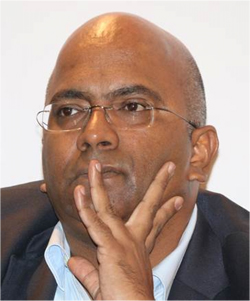
Tata Projects appointed Ganesh Chandan as its CHRO. Chandan, who joined Tata Projects recently, comes from Greaves Cotton, where he had been serving as the CHRO for over a year and a half. Chandan shares that in the next five years India will be gearing towards significant infrastructure development and within that, Tata Projects will take up a large chunk of the responsibility. It is this growth prospect that made Chandan make the move. “Tata Projects is well positioned in the infrastructural development domain and joining as their CHRO, I look forward to contributing in terms of building a strong HR function and culture within the organisation,” said Chandan about his new assignment. He went on to add, “This fast-growing infrastructure development business under the Tata Group that is expected in the coming years excites me and makes my role more challenging and interesting here.” The IIT Bombay alumnus Chandan completed his master’s from the Tata Institute of Social Sciences (TISS). His first step into the corporate world was with Titan Industries. Chandan has over two decades of experience as he worked across sectors. However, he has spent a large part of his career—around 10 years—at Oracle, in various roles. For five years, he headed HR for Oracle Financial Services, based out of New York. Prior to Greaves Cotton, he was the president and CHRO at Suzlon. Before joining Suzlon, he was the CHRO & head-administration at Avantha ERGO Life Insurance. Prior to that, he headed HR at the power and infrastructure division of Avantha Group.
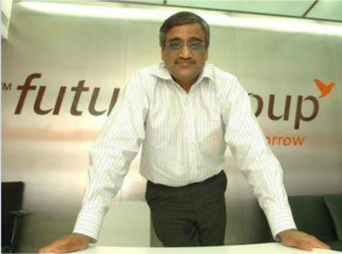
Even as Walmart rushes to acquire Flipkart to challenge Amazon, India’s pioneer retailer Kishore Biyani still wants to fight online retail with a unique strategy, Retail 3.0, which makes use of the online-to-offline model. Biyani’s model blends technology with brick-and-mortar retail. The vast growth opportunity in online retail in India has triggered the war between Flipkart and Amazon. However, Biyani’s calculation is different. According to him, nearly 10-15% customers are acquired online-to-offline (O2O) by Future Group, and he expects it to go up to 35%, especially through online promotions. He says understanding India is not easy for a retailer. A global retailer needs to adapt to the local style of retailing, he says. Now it is commonly believed that the doomsday scenario of online finishing off the brick-and-mortar retail was wrong. It is the hybrid model that would work in the long run. That’s why Biyani’s Future Group, which controls nearly a third of the country’s organised food and grocery market, may be an attraction for online retailers. Biyani had met Jeff Bezos of Amazon in the US in January to discuss a possible alliance. Biyani has also travelled to China to meet Alibaba officials in the recent past to study its model and see if that can be replicated in India. Amazon and Flipkart could be pouring billions of dollars into online retail but India’s retail king won’t be convinced. Comparing e-commerce companies to typewriters which gave way to computers and died down, Biyani has said that e-commerce companies in India barely contribute to less than 0.2% of total retail sales and would never be able to make money in India.
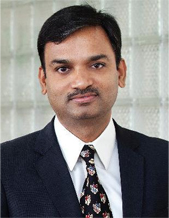
Alok Ranjan who was the people director at AB InBev India, the Belgium-headquartered beverages and brewing company till recently, has joined the Flipcarbon team, as co-founder & CEO. Ranjan comes with over two decades of experience. Throughout his career, he has worked only with beverages companies, first with Shaw Wallace for five years, then with SABMiller for 14 years and lastly with AB InBev India for a little over a year. Flipcarbon, an integrated HR services company, was founded by Prabhash Nirbhay, in 2014. Recently, Sanjay Pratap also came on board as co-founder. Prior to that, Pratap worked with MolsonCoors India as HR director. “After a successful three and a half years, wherein we grew from a new venture to a young and respected differentiator, we were seeking a visionary leader in HR, who will bring deep domain expertise, industry network and repute, and lead our next level of growth,” said Nirbhay. Reacting to the move Ranjan stated, “After an immensely satisfying professional journey transforming the perception of what HR can do inside organisations, it was only logical that I seek the next big challenge.”
by Joe Williams